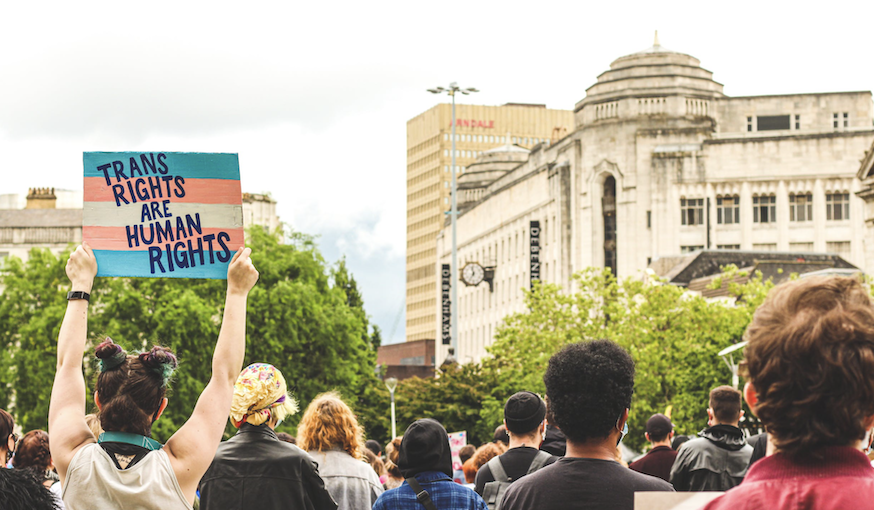Female genital cutting (FGC), which is the practice of removing or harming the female genitalia for non-medical reasons, is a human rights violation recognized by the UN. Right now, legislators in Texas and Idaho are looking to use pre-existing bans on FGC to block transgender youth from receiving life-saving, medically necessary gender-affirming treatments. This is a discriminatory action that has no basis in the crucial work to end FGC.
Gender-affirming care can include social interventions, pubertal suppression, hormone therapy, and gender-affirming surgeries. Social interventions are typically the first step; use of a new name and pronouns, wearing different clothing, and engaging in new activities are often a part of this process. Pubertal suppression is a method of delaying puberty, and hormonal therapy causes secondary sex characteristic development that aligns with one’s gender. Both are reversible and associated with better mental health outcomes for transgender youth. Gender-affirming surgeries, such as mastectomies and vaginoplasty, are irreversible treatments performed on older adolescents who have shown a consistent gender identity and have stable mental health and parental support. Research has shown that these treatments lead to decreased rates of depression, improvement in psychosocial functioning, and minimal long-term side effects.
Transgender and nonbinary adolescents experience anxiety, depression, and suicidal ideation at higher rates than cisgender people. According to a report from The National Center for Transgender Equality, 40% of transgender people in the U.S. had attempted suicide at some point in their lives, which is nearly nine times the nationwide suicide rate. Gender-affirming care can significantly improve this mental health crisis. Governor Greg Abbott of Texas was most definitely mistaken when he said “any type of genital mutilation is child abuse” regarding gender-affirming surgery; it is not mutilation, and denial of this care could be more accurately called a form of child abuse by failing to treat serious mental health needs. Texas has attempted to pass several laws that ban transgender youth from access to puberty blockers, hormone therapy, and surgery. Just last year, two of these bills died in session. These failed attempts have led legislatures to turn to FGC laws as a way of making gender-affirming surgery illegal for transgender kids.
Idaho is taking discriminatory actions similar to Texas. Earlier this month, a bill that would amend the state’s existing law on FGC to ban hormone therapy, puberty blockers, and sex reassignment surgeries cleared a House committee. The amendment would also make it a felony for doctors to provide these services, placing physicians in the tragic position of needing to risk their medical license if they want to provide life-saving care to transgender adolescents. The senate opposes this bill, so, fortunately, it is unlikely to pass. Disappointingly, their reasons for opposing the bill are neither because they see the necessity of gender-affirming care nor because they disagree with conflating this care with FGC. Rather, they do not see the bill as necessary, as many Idaho physicians are unwilling to provide gender-affirming care anyway, and fear the bill undermines the parents’ authority to make decisions for their children.
Texas’s and Idaho’s legislators justify their actions with claims that these medical interventions are similar to FGC in that they are both unnecessary. Yet, gender-affirming care has medical benefits (e.g. improving mental health), while FGC does not. In fact, FGC often leads to harmful psychological outcomes, including PTSD, anxiety, and depression.
Another faulty comparison drawn between FGC and gender-affirming care is that they are both irreversible. It is true that FGC has irreversible physical and psychological harms, but this is not the case for all treatments for transgender youth. Again, health professionals consider pubertal suppression and hormone therapy to be reversible. Gender surgery is permanent, but research has shown that regrets about having this procedure are very rare. The benefits of gender-affirming care (improved psychosocial functioning and autonomy over one’s gender identity) paired with the high risk of withholding treatment (worsened mental health outcomes, suicidal ideation and use of non-prescription hormones) support the importance of providing this care.
Lastly, medical care for transgender people is their choice as part of their right to bodily autonomy, whereas FGC violates a girl’s right to bodily autonomy. Minors are often forced to undergo FGC and are too young to fully understand what is occurring and give their consent. Furthermore, consent cannot be given when there is coercion. FGC often exists as a result of societal pressure placed on girls who are told FGC is necessary for them to be a woman, to be a member of their own culture and society, and to be married. Consent can not be freely given to undergo FGC, because coercion will always be a dangerous factor. It is harmful and incorrect to conflate FGC with gender-affirming care.
I want to make clear that FGC survivors and transgender and non-binary people are not mutually exclusive communities. People who have undergone FGC and do not identify as a cisgender woman in particular would be harmed by legislation that defines gender-affirming treatments as FGC. To learn more about the nuanced experiences of non-cisgender survivors of FGC, I recommend Dena Igusti’s article on being a non-binary survivor and Dear Massi’s advice column for a transgender man who underwent FGC as a child.

